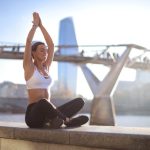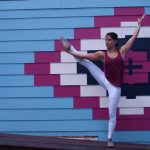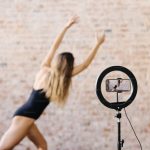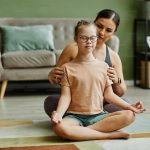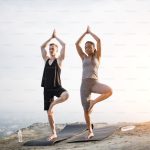Fiona Roberts is on a mission to provide every woman with the right to exercise. This empathetic young CEO and founder began her early career in youth and community work, and her subsequent training as a Personal Trainer led her to set up theMovement Charity. We find out all about Fiona’s journey to setting up a charity, why she feels women should be supporting each other and why being trauma-informed is so important for fitness providers.
1. Where did the idea for theMovement charity come from?
My degree and early work were in youth and community work, especially with young women in terms of safeguarding. I was always passionate about helping other women, I think it came from an early awareness of my own privilege and wanting to find a way to be in a position to help those with a lot less privilege.
The real starting point for me was my experiences through youth work. One of the charities I worked with was Faith House, which provides support to those working in the sex industry. Part of my role was to go to a certain part of London on a Friday night and chat to women involved in street prostitution and give out condoms and sweets and generally build relationships.
To be honest I always felt passionate about women supporting women, and working as a collective. My feeling is that if you have skills that can help and support other people who need them, why wouldn’t you use them?
2. How did movement become important to you?
When I was 19 years old I was in bed on and off for about a year with glandular fever, followed by chronic fatigue. At that age, a year is a big percentage of your life! This all happened at the same time as I was doing my degree and the youth work. It was really hard as I would push it if I needed to, but then I would pay for it the following day.
Getting into exercise and movement was a big part of my physical and mental recovery.
3. Setting up a thriving charity at your young age is quite an achievement, how did you do it?
It kind of happened accidentally! When I began to see the benefits of movement and exercise I realised that it’s often women with multiple disadvantages who have the least access to these benefits.
I started looking around to find a charity or organisation that provided access to exercise for those women, and I couldn’t find anything out there. So I thought I’d just set it up myself! When I started out I was a little naïve, but I have a great team of trustees, and together we’ve made it happen.
4. Setting up a charity is no easy process. How did you go about it?
I started theMovement as a small social enterprise offering my own services as a personal trainer to charities and the local area. I wanted to grow my social impact and have a more sustainable model for growth, which is why I decided to set up as an official charity.
It was a long process that took over eight months. We ticked the final boxes in February 2020, and we all know what happened then!
6. What effect did lockdown have on your work?
Lockdown threw a big spanner in the works. But we extended our timelines and actually it hasn’t affected our growth nearly as much as we thought it might. In fact, lockdown helped everyone to reflect on what’s important and people wanted to give back. The need is greater than ever and fitness professionals and charities have really stepped up.
7. What do you personally enjoy about being a personal trainer?
I love the fact that personal training gives people the ability to express freedom in movement. I’m not a regimented instructor and I’m much more about choice-making, listening to your body, and doing what feels right on the day.
8. And what are the best moments?
We’ve had beautiful moments, for example, there was a session that I was leading and someone said it was the most positive thing they’d done in years, which is amazing to hear. It’s also great to hear feedback from lots of other trainers – seeing women grow in confidence and strength, doing things they didn’t think they would be able to do and noticing things in their bodies that hadn’t been accessible to them previously.
It’s these small moments, where women start to feel more confident, gain self-esteem and get to know themselves better that make it all worth it.
9. What’s your go-to mode of exercise when you’re feeling frazzled?
Well, I’ll be honest that when exercise is what you do professionally it can be harder to motivate yourself to do it in your own time. I tend to get outside in nature and go for walks or jogs. I also enjoy strength training and the subsequent feeling of being strong. I do also rest for what might appear to be long periods of time.
10. What’s your goal for theMovement Charity?
It seems that the need for what we do is nationwide, so that’s the direction that we’ll be heading in the next few years. But we want to be able to do that really sustainably and well, because being trauma-informed is at the core of what we do. So we want to make sure that there’s a support system for volunteers and service users, so we’re working to grow in a way that can do that.
Also, we’re really excited to be working with YogaLondon to develop trauma awareness training for fitness professionals, trying to help the fitness industry as a whole become more trauma-informed. There can be this feeling of ‘us’ and ‘them’ in the way that we do charity, but the awareness is that many of us have experienced trauma and all of us would benefit from the fitness industry being more trauma-informed and that’s one of our aims as a charity.
11. What are your three top tips for creating a safe exercise space?
My first tip is to be predictable. Start and end your session the same way every time. This builds consistency and makes users feel safe and secure. Yoga classes are actually great for this.
Secondly, consider potential triggers, for example, using certain equipment or language such as analogies. So offer choice when asking people to use equipment and make it clear that it’s optional, especially things like straps. Make sure the language you use is neutral and not likely to cause feelings of anxiety.
Thirdly, build trust. A personal training example is the use of the extra-long ‘ten-second’ countdown – that lasts a minute plus. It can be a funny thing but being really consistent with your words and actions helps to build trust, so if you say ten seconds, make sure it is ten seconds.
12. What are you most proud of?
Seeing where theMovement’s come from is something that makes me extremely happy and proud. As a team, we’ve worked hard to be able to come from this small idea that we weren’t sure was going to work, to now having 15 sessions running weekly and getting amazing feedback from service users. And by the end of next month, there will be three or four more classes starting up.
We’re so excited to be partnering with YogaLondon and we’re really looking forward to the wisdom, ideas, resources, and support to be able to increase the work of theMovement. This will be an ongoing partnership with YogaLondon supporting us through fundraising, providing volunteers, and helping us develop our training.
If you’re interested in getting involved, then please get in touch with theMovement Charity, or our contact at YogaLondon, who’ll point you in the right direction.


